ANNUAL $400M IMPORTS OF CHICKEN IS A SHAME – President John Mahama

Ghana spends almost $400 million every year buying chicken from other countries, according to President John Mahama.
He said that Ghanaians should feel ashamed about having to import so much chicken. He announced a plan to help 54 people raise four million chickens, which would equal 10,000 metric tons of chicken.
The President talked about how the government is committed to improving livestock farming. This includes increasing the production of cattle, goats, and sheep, and providing farmers with better breeds.
He shared these plans during the launch of the government’s Feed Ghana Programme in Techiman, Bono East Region.
Part of the programme is focused on livestock production and aims to improve farm infrastructure. This means setting up irrigation systems, building better roads, providing electricity, and constructing warehouses to attract private investments.
The President believes this programme will increase farming and improve how agricultural products are processed.
To support the programme’s start, President Mahama gave maize seeds, fertilizers, a Kia truck, and tractors to the Ghana Prisons Service and the National Service Authority.
He urged everyone to work together to transform the country’s agriculture for economic growth and prosperity. He emphasized that the Feed Ghana Programme is a proactive effort rather than just a policy.
While acknowledging existing challenges in the agriculture sector, the President is optimistic about the programme’s success. He invited farmers, agribusinesses, banks, and development partners to work together to ensure positive results.
The programme aims to take strategic steps to boost food production, encourage modern farming techniques, improve infrastructure, and create agro-industrial zones across the country.
President Mahama talked about important parts of the Feed Ghana Programme. This programme involves smart agriculture by setting up farmer service centers across the country. These centers will help farmers with crucial services like using machines, getting quality materials, financial support, access to markets, basic processing, and training.
He also announced the creation of farm banks or land banks in areas with good water supply, aimed at supporting young people who want to start agricultural businesses, thereby boosting national food production.
Another key part of the programme is focused on increasing the growth of grains and legumes, such as maize, rice, soya beans, and sorghum. These crops are important for food, processing into other products, and exporting to other countries.
The vegetable development project, called ‘Yeredua’, seeks to lower vegetable imports by encouraging local cultivation. Investing in farming with controlled environments, like greenhouses, and promoting urban and peri-urban agriculture is essential. Schools are encouraged to grow their own vegetables in gardens.
Additionally, the programme will promote farming in communities and homes. This allows families to grow vegetables such as tomatoes, peppers, and garden eggs at home, enhancing self-sufficiency. Support will also extend to institutions like Senior High Schools to get land for crop production and livestock farming.
Finally, the programme will focus on revitalizing the poultry industry through the “Nkoko Nketenkete” project, a key effort to boost local poultry farming.
NKONKONSA.com





